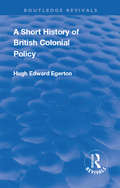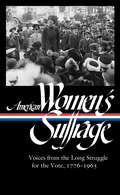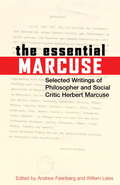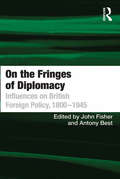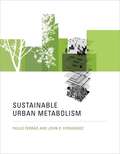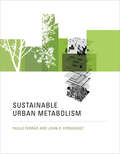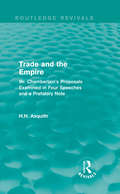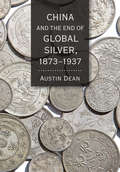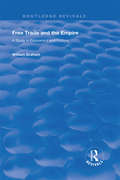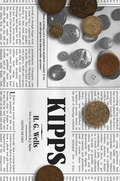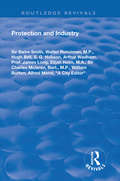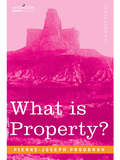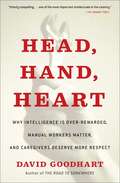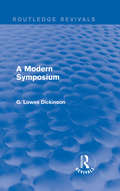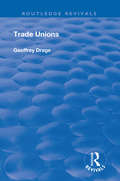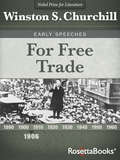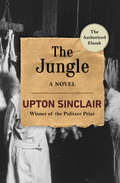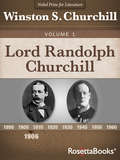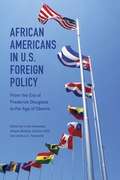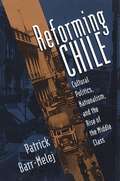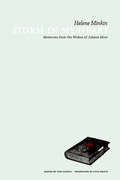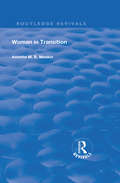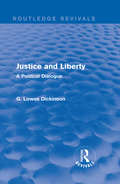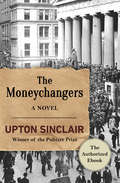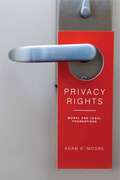- Table View
- List View
A Short History of British Colonial Policy (Routledge Revivals)
by Hugh Edward EgertonThis volume discusses a short history of British Colonial policy. With all its faults the book represents much reading and some thought. In writing what is, to some extent, a history of opinion, it has been impossible altogether to suppress my own individual opinions. I trust, however that I have not seemed to attach importance to them. In dealing with the later periods, I remembered Sir Walter Raleigh's remark on the fate which awaits the treatment of contemporary history; but obscurity may claim its compensations, and atleast I am not conscious of having written under the bias of personal or party prejudice.
American Women's Suffrage: Voices from the Long Struggle for the Vote 1776-1965 (The Library of America)
In their own voices, the full story of the women and men who struggled to make American democracy wholeWith a record number of female candidates in the 2020 election and women's rights an increasingly urgent topic in the news, it's crucial that we understand the history that got us where we are now. For the first time, here is the full, definitive story of the movement for voting rights for American women, of every race, told through the voices of the women and men who lived it. Here are the most recognizable figures in the campaign for women's suffrage, like Elizabeth Cady Stanton and Susan B. Anthony, but also the black, Chinese, and American Indian women and men who were not only essential to the movement but expanded its directions and aims. Here, too, are the anti-suffragists who worried about where the country would head if the right to vote were universal. Expertly curated and introduced by scholar Susan Ware, each piece is prefaced by a headnote so that together these 100 selections by over 80 writers tell the full history of the movement--from Abigail Adams to the 1848 Declaration of Sentiments to the ratification of the Nineteenth Amendment in 1920 and the limiting of suffrage under Jim Crow. Importantly, it carries the story to 1965, and the passage of the Voting and Civil Rights Acts, which finally secured suffrage for all American women. Includes writings by Ida B. Wells, Mabel Lee, Margaret Fuller, Sojourner Truth, Frances Ellen Watkins Harper, Frederick Douglass, presidents Grover Cleveland on the anti-suffrage side and Woodrow Wilson urging passage of the Nineteenth Amendment as a wartime measure, Jane Addams, and Charlotte Perkins Gilman, among many others.
The Essential Marcuse
by William Leiss Andrew Feenberg Herbert MarcuseThe Essential Marcuse provides an overview of Herbert Marcuse's political and philosophical writing over four decades, with excerpts from his major books as well as essays from various academic journals. The most influential radical philosopher of the 1960s, Marcuse's writings are noteworthy for their uncompromising opposition to both capitalism and communism. His words are as relevant to today's society as they were at the time they were written.From the Trade Paperback edition.
On the Fringes of Diplomacy: Influences on British Foreign Policy, 1800–1945
by Antony BestIn recent decades the study of British foreign policy and diplomacy has broadened in focus. No longer is it enough for historians to look at the actions of the elite figures - diplomats and foreign secretaries - in isolation; increasingly the role of their advisers and subordinates, and those on the fringes of the diplomatic world, is recognised as having exerted critical influence on key decisions and policies. This volume gives further impetus to this revelation, honing in on the fringes of British diplomacy through a selection of case studies of individuals who were able to influence policy. By contextualising each study, the volume explores the wider circles in which these individuals moved, exploring the broader issues affecting the processes of foreign policy. Not the least of these is the issue of official mindsets and of networks of influence in Britain and overseas, inculcated, for example, in the leading public schools, at the Universities of Oxford and Cambridge, and in gentlemen's clubs in London's West End. As such the volume contributes to the growing literature on human agency as well as mentalité studies in the history of international relations. Moreover it also highlights related themes which have been insufficiently studied by international historians, for example, the influence that outside groups such as missionaries and the press had on the shaping of foreign policy and the role that strategy, intelligence and the experience of war played in the diplomatic process. Through such an approach the workings of British diplomacy during the high-tide of empire is revealed in new and intriguing ways.
Sustainable Urban Metabolism
by Paulo Ferrão John E. FernándezUrbanization and globalization have shaped the last hundred years. These two dominanttrends are mutually reinforcing: globalization links countries through the networked communicationsof urban hubs. The urban population now generates more than eighty percent of global GDP. Citiesaccount for enormous flows of energy and materials -- inflows of goods and services and outflows ofwaste. Thus urban environmental management critically affects global sustainability. In this book,Paulo Ferrão and John Fernndez offer a metabolic perspective on urban sustainability, viewingthe city as a metabolism, in terms of its exchanges of matter and energy. Their book provides aroadmap to the strategies and tools needed for a scientifically based framework for analyzing andpromoting the sustainability of urban systems. Using the concept of urbanmetabolism as a unifying framework, Ferrão and Fernandez describe a systems-oriented approachthat establishes useful linkages among environmental, economic, social, and technical infrastructureissues. These linkages lead to an integrated information-intensive platform that enablesecologically informed urban planning. After establishing the theoretical background and describingthe diversity of contributing disciplines, the authors sample sustainability approaches and tools,offer an extended study of the urban metabolism of Lisbon, and outline the challenges andopportunities in approaching urban sustainability in both developed and developing countries.
Sustainable Urban Metabolism
by Paulo Ferrao John E. FernandezA unified framework for analyzing urban sustainability in terms of cities' inflows and outflows of matter and energy.Urbanization and globalization have shaped the last hundred years. These two dominant trends are mutually reinforcing: globalization links countries through the networked communications of urban hubs. The urban population now generates more than eighty percent of global GDP. Cities account for enormous flows of energy and materials—inflows of goods and services and outflows of waste. Thus urban environmental management critically affects global sustainability. In this book, Paulo Ferrão and John Fernández offer a metabolic perspective on urban sustainability, viewing the city as a metabolism, in terms of its exchanges of matter and energy. Their book provides a roadmap to the strategies and tools needed for a scientifically based framework for analyzing and promoting the sustainability of urban systems. Using the concept of urban metabolism as a unifying framework, Ferrão and Fernandez describe a systems-oriented approach that establishes useful linkages among environmental, economic, social, and technical infrastructure issues. These linkages lead to an integrated information-intensive platform that enables ecologically informed urban planning. After establishing the theoretical background and describing the diversity of contributing disciplines, the authors sample sustainability approaches and tools, offer an extended study of the urban metabolism of Lisbon, and outline the challenges and opportunities in approaching urban sustainability in both developed and developing countries.
Routledge Revivals: Mr. Chamberlain's Proposals Examined in Four Speeches and a Prefatory Note (Routledge Revivals Ser.)
by H.H. AsquithFirst published in 1903, this collects together speeches given by H.H. Asquith to refute the charge that those who defended Free Trade at the turn of the century were ignorant or indifferent to actual and potential economic forces, and also clung to obsolete conceptions of the Empire. The author intends to vindicate Britain’s contemporaneous fiscal system, not as academic dogma, but as a concrete and living financial policy. In pursuit of this he undertakes to expose what he argues are the "blunders of fact and logic" of the new protectionist campaign, illustrated with extracts from the speeches of the Chancellor of the Exchequer Austen Chamberlain — whose advocacy of protectionism provides the focus for the collected speeches.
China and the End of Global Silver, 1873–1937 (Cornell Studies in Money)
by Austin DeanIn the late nineteenth century, as much of the world adopted some variant of the gold standard, China remained the most populous country still using silver. Yet China had no unified national currency; there was not one monetary standard but many. Silver coins circulated alongside chunks of silver and every transaction became an "encounter of wits." China and the End of Global Silver, 1873–1937 focuses on how officials, policy makers, bankers, merchants, academics, and journalists in China and around the world answered a simple question: how should China change its monetary system? Far from a narrow, technical issue, Chinese monetary reform is a dramatic story full of political revolutions, economic depressions, chance, and contingency. As different governments in China attempted to create a unified monetary standard in the late nineteenth and early twentieth century, the United States, England, and Japan tried to shape the direction of Chinese monetary reform for their own benefit. Austin Dean argues convincingly that the Silver Era in world history ended owing to the interaction of imperial competition in East Asia and the state-building projects of different governments in China. When the Nationalist government of China went off the silver standard in 1935, it marked a key moment not just in Chinese history but in world history.
Free Trade and the Empire: A Study in Economics and Politics (Routledge Revivals)
by William Graham Filippo UgoliniOriginally published in 1904. The chief object of this pamphlet is to set forth, in a connected form, the main aspects of the great tariff controversy now for some time before the public; to treat the question more deeply and fully than the exigencies of the platform usually allow; and at the same time to treat it, as far as may be, from a scientific and as little as possible from a party point of view. The question is one both of economics and politics, and it raises the most important and delicate and complicated issues in both subjects.
Kipps: With an introduction by D.J. Taylor
by H.G. Wells'FIRST ELECTRICITY. AND THEN TELEPHONES. I FEEL AS IF I WERE LIVING IN AN H G WELLS NOVEL' DOWAGER COUNTESS OF GRANTHAM'You can enjoy the novel as a jolly yarn about faux pas - there's a bit of Kipps in most of us - but you also sense that Wells found its theme a little close to the bone . . . As social inequality threatens to rise, it's hard not to wonder - despite the happy ending - if Kipps belongs to britain's future as well as its past' GuardianOrphaned at an early age, raised by his aunt and uncle, and apprenticed for seven years to a draper, Artie Kipps is stunned to discover upon reading a newspaper advertisement that he is the grandson of a wealthy gentleman and the inheritor of his fortune. Thrown dramatically into the upper classes, he struggles desperately to learn the etiquette and rules of polite society. But as he soon discovers, becoming a `true gentleman' is neither as easy nor as desirable as it at first appears...
Protection and Industry (Routledge Revivals)
by Swire Sir Smith Walter M.P. Runciman Hugh Bell S.G. Hobson Arthur Wadham James Prof. Long Elijah M.A. Helm Charles Sir McLaren M.P Bart. William Burton Alfred Mond "A City Editor"First published in 1904, this volume emerged during a split within the Liberal Unionist Party over Joseph Chamberlain’s advocacy of Protectionism through Tariff Reform. Having originally broken with the Liberal Party over Home Rule in 1885, 1904 saw some Liberal Unionists return to the Liberal fold. The authors here constitute those departing Liberal Unionists in a multifaceted rallying call for Free Trade in the face of Protectionism. Their articles, on subjects such as Shipping, Agriculture and Engineering, assess the implications of Free Trade with a focus on each author’s specialist industry. The authors unanimously declare in favour of the system under which, they maintain, Great Britain developed unparalleled prosperity and taught other nations her industrial success. In the process, they demonstrate that trade cannot improve whilst fettered and focus on the potential for real improvements through Free Trade.
What is Property?
by Pierre-Joseph ProudhonProudhon's most famous declaration that "property is theft" comes from this, his most famous work, published in French in 1840; the English translation dates from 1890. According to Proudhon, only that which is being used is real property. Land must be lived on or farmed to be property, and goods must have been made by one's own labor to be owned. These new definitions challenge the very basis of capitalist systems, and Proudhon used them as the foundation for his writings in support of anarchy. Activists, historians, and philosophers will find themselves pondering his arguments long after they have finished reading.
Head, Hand, Heart: Why Intelligence Is Over-Rewarded, Manual Workers Matter, and Caregivers Deserve More Respect
by David GoodhartA Financial Times Best Book of the Year 2020A TIMELY AND PROVOCATIVE ARGUMENT FROM LEADING POLITICAL ANALYST DAVID GOODHART ABOUT THE SEVERELY IMBALANCED DISTRIBUTION OF STATUS AND WORK IN WESTERN SOCIETIES.The coronavirus pandemic revealed what we ought to have already known: that nurses, caregivers, supermarket workers, delivery drivers, cleaners, and so many others are essential. Until recently, this work was largely regarded as menial by the same society that now lauds them as heroes. How did we get here?In his groundbreaking follow-up to the bestselling The Road to Somewhere, David Goodhart divides society into people who work with their Heads (cognitive work), with their Hands (manual work), or with their Hearts (caring work), and considers each group&’s changing status and influence. Today, the &“best and the brightest&” trump the &“decent and hardworking.&” Qualities like character, compassion, craft, and physical labor command far less respect in our workforce. This imbalance has led to the disaffection and alienation of millions of people.David Goodhart reveals the untold history behind this disparity and outlines the challenges we face as a result. Cognitive ability has become the gold standard of human esteem, and those in the cognitive class now shape society largely in their own interest. To put it bluntly: smart people have become too powerful.A healthy democratic society respects and rewards a broad range of achievement, and provides meaning and value for people who cannot—or do not want to—achieve in the classroom and professional career market. We must shift our thinking to see all workers as essential, and not just during crises like the coronavirus pandemic. This is the dramatic story of the struggle for status and dignity in the 21st century.
A Modern Symposium (Routledge Revivals: Collected Works of G. Lowes Dickinson)
by G. Lowes DickinsonFirst published in 1905, A Modern Symposium presents a record of a discussion between men at the Seekers club- a now extinct, but then famous, club for men prominent in politics or in the professions- that used to meet fortnightly to listen to, and discuss papers on varying subjects. The group included politicians, a professor, a journalist and a poet, amongst others. At this particular meeting, the participants start their discussion by discussing reasons for going into politics in the first place, and why the key speakers aligned themselves with particular political parties, which leads on to a full and thought-provoking discussion of civilisation. "Has been a source of inspiration to many thousands of readers… It is almost an encyclopaedia of common sense." Everyman "One of the most thought-provoking and, therefore, useful books of our time. No one interested in the problems of life, as these are presented to us day by day, can fail to be the wiser and better by a perusal of Professor Lowes Dickinson’s admirable statement of these problems and the hints he gives on their solution." Scottish Educational Journal "A brilliant little book, at once serious and gay, in which various contrasted characters discuss our civilisation." E. M. Forster in The Listener
Trade Unions (Routledge Revivals)
by Geoffrey DrageFirst published in 1905, this book offers a perspective on the aims and objectives of British trade unions. It details the history, constitution and aims of the trade union, challenging the misconception that a trade union exists solely to foster strikes, harass employers and hamper industry, and discussing the many positives of such organisations. Designed to be accessible for the general public, this book covers history, organisation, function, action and influence.
For Free Trade (Winston S. Churchill Early Speeches)
by Winston S. ChurchillThis collection of speeches in support of free trade by the future Prime Minister tracks his early rise in British Parliament. Throughout his career—as both a Conservative and a Liberal—Winston Churchill was a strong supporter of free trade. As a Conservative, this position was sometimes controversial; early in his career, Churchill opposed Joseph Chamberlain's strategy of imposing tariffs to protect Britain&’s economic dominance. When he defected to the Liberal Party in 1904, Churchill continued to be a fierce free trade advocate. Originally published in 1906, For Free Trade was an influential political pamphlet that made Churchill&’s speeches on the subject available to the British people. This collection contains speeches delivered in Manchester or The House of Commons between 1902 and 1905.
The Jungle: A Novel (The Best Sellers Of 1906 Series)
by Upton SinclairThe classic protest novel that exposed harsh working conditions and unsanitary practices in the meatpacking industry A slaughterhouse worker from Lithuania, Jurgis Rudkus immigrated to turn-of-the-century Chicago believing that he would find freedom and prosperity. Instead, meager wages and a filthy, dangerous workplace drive him deep into debt and despair. Victimized, abused, and utterly alone, Jurgis and his wife, Ona, face a lifetime of never-ending struggle in a merciless urban jungle. An extraordinary work of fiction based in cold, hard fact, The Jungle is one of the most influential novels ever written. Privately published in 1906, it quickly became an international bestseller, inspiring sweeping and essential changes, including the passage of the Pure Food and Drug Act. Powerful and provocative, poignant and horrifying, The Jungle is Upton Sinclair's masterwork. This ebook has been authorized by the estate of Upton Sinclair.
Lord Randolph Churchill Volume 1 (Lord Randolph Churchill #1)
by Winston S. ChurchillThe first volume of the Nobel Prize-winning Prime Minister&’s biography of his father, the fiery Conservative Party leader of late Victorian Britain. In 1906, Sir Winston Churchill produced a two-volume biography of his father Lord Randolph Churchill, the 19th century Member of Parliament whose political career ended in scandal. This first volume deals with early events in Randolph&’s life, including his upbringing, his education, and his election to the House of Commons as the Conservative MP for Woodstock. This volume also recount&’s Randolph&’s quarrel with the Prince of Wales in a daring gambit to protect the integrity of the Churchill family name. This episode resulted in Churchill&’s temporary exile from British high society, a prequel to his later disgrace. While Winston Churchill is clearly a supporter of his father&’s, he is not afraid to be honest about the mistakes and failures of his career and personal life.
African Americans in U.S. Foreign Policy: From the Era of Frederick Douglass to the Age of Obama
by Linda Heywood Allison Blakely Charles Stith Joshua C. YesnowitzBookended by remarks from African American diplomats Walter C. Carrington and Charles Stith, the essays in this volume use close readings of speeches, letters, historical archives, diaries, and memoirs of policymakers and newly available FBI files to confront much-neglected questions related to race and foreign relations in the United States. Why, for instance, did African Americans profess loyalty and support for the diplomatic initiatives of a nation that undermined their social, political, and economic well-being through racist policies and cultural practices? Other contributions explore African Americans' history in the diplomatic and consular services and the influential roles of cultural ambassadors like Joe Louis and Louis Armstrong. The volume concludes with an analysis of the effects on race and foreign policy in the administration of Barack Obama. Groundbreaking and critical, African Americans in U.S. Foreign Policy expands on the scope and themes of recent collections to offer the most up-to-date scholarship to students in a range of disciplines, including U.S. and African American history, Africana studies, political science, and American studies.
Reforming Chile
by Patrick M. Barr-MelejHighlighting the crucial yet largely overlooked role played by society's middle layers in the historical development of Latin America, Patrick Barr-Melej provides the first comprehensive analysis of the rise of Chile's middle-class reform movement and its profound impact on that country's cultural and political landscapes. He shows how a diverse collection of middle-class intellectuals, writers, politicians, educators, and bureaucrats forged a "progressive" nationalism and advanced an ambitious cultural-political project between the 1890s and 1940s. Together, reformers challenged the power of elite groups and sought to quell working-class revolutionary activism as they endeavored to democratize culture and fortify liberal democracy.Using sources that range from archival documents and newspapers to short stories, novels, and school textbooks, Barr-Melej examines the reform movement's cultural ideas and their political applications, especially as they were articulated in the areas of literature and public education. In the process, he provides a new framework for understanding Chile's cultural and political evolution, as well as the complicated place of the middle class in a society experiencing the swift changes inherent in capitalist modernization.
Storm in My Heart
by Helene MinkinPartner of one of the most infamous anarchists of her time, Johann Most, Helene Minkin joined the anarchist movement after emigrating from Russia in 1888 with her father and sister. Framed as a reaction and corrective to Emma Goldman's Living My Life, Minkin's memoir provides a unique account of turn-of-the-century anarchism and immigrant life in the United States. Published in the Yiddish-language newspaper Forverts in 1932, this is its first English translation. Tom Goyens teaches American history at Salisbury University in Maryland. He is the author of Beer and Revolution: The German Anarchist Movement in New York City, 1880–1914.
Woman in Transition (Routledge Revivals)
by Annette M. MeakinOriginally published in 1907. The woman movement is one of the greatest problems of our age, and those who travel with their eyes open known that it may be studied in every book and corner of our globe. This book contains chapters on girlhood in many lands, the young wife, thoughts on motherhood, and the eventuality of widowhood.
Justice and Liberty: A Political Dialogue (Routledge Revivals: Collected Works of G. Lowes Dickinson)
by G. Lowes DickinsonFirst published in 1908, this book takes the form of a discussion between Henry Martin- a professor, Charles Stuart- a banker, and Sir John Harington- a gentleman of leisure, on politics and civilisation. The speakers discuss many topics ranging from forms of society (such as oligarchy or democracy), to the institution of marriage, to the necessity of government.
The Moneychangers: A Novel
by Upton SinclairA financial thriller based on the Panic of 1907 by the Pulitzer Prize-winning author of The Jungle In 1907 the stock market crashed as a result of the manipulations of a group of powerful, wealthy, and unscrupulous men. The repercussions were felt across the nation, taking a devastating toll on thousands of small investors and hardworking Americans. The Moneychangers, written a century before the term "too big to fail" became part of the national lexicon, dramatizes the secret dealings of the one-percenters who brought the national economy to the brink of collapse. Lawyer Allan Montague is at home among New York City's wealthiest and most influential citizens. His position provides him with an insider's perspective on the motivations of the financial elite--and what he sees isn't always pretty. Now, a small group of very rich men intend to take down a rival, even if it means wiping out the livelihoods and savings of thousands and thousands of unsuspecting citizens in the process. Powerless to stop the plot, all Montague can do is try to save the woman he loves from a tragic collision of jealousy, avarice, and lust. This ebook has been authorized by the estate of Upton Sinclair.
Privacy Rights: Moral and Legal Foundations
by Adam D. MooreWe all know that Google stores huge amounts of information about everyone who uses its search tools, that Amazon can recommend new books to us based on our past purchases, and that the U.S. government engaged in many data-mining activities during the Bush administration to acquire information about us, including involving telecommunications companies in monitoring our phone calls (currently the subject of a bill in Congress). Control over access to our bodies and to special places, like our homes, has traditionally been the focus of concerns about privacy, but access to information about us is raising new challenges for those anxious to protect our privacy. In Privacy Rights, Adam Moore adds informational privacy to physical and spatial privacy as fundamental to developing a general theory of privacy that is well grounded morally and legally.
